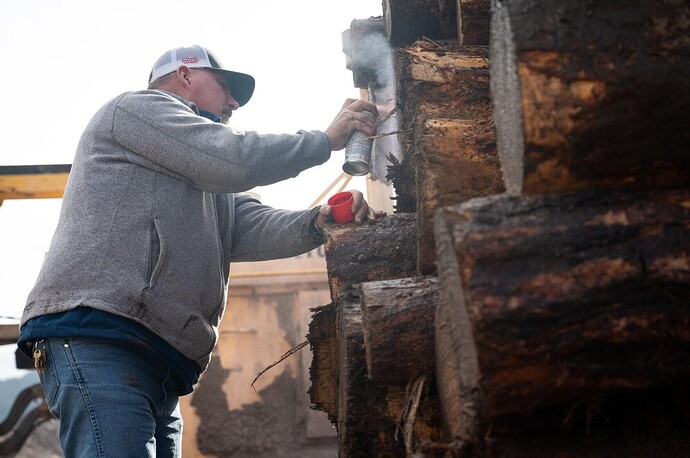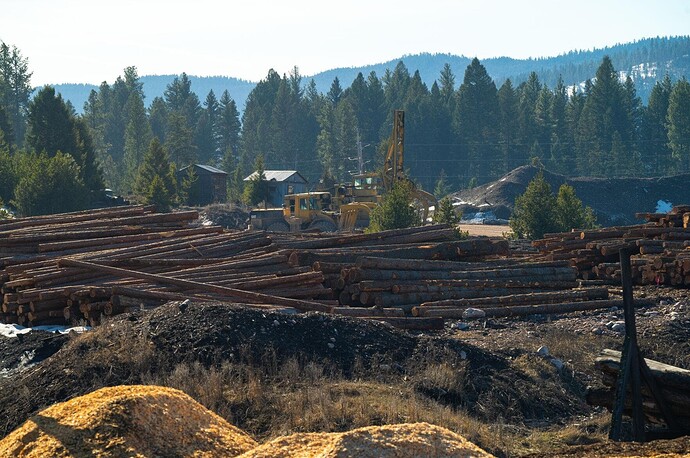State and federal timberland around central Montana could bring in less money as the price for transporting logs increases, a trend that has been growing as fewer mills operate near the state’s expansive forests.
Timber sales around Seeley Lake could drop the most. Pyramid Mountain Lumber, the town’s mill, plans to close next month unless a new buyer helps the business stay open.
Pyramid General Manager Todd Johnson told the Missoulian on Friday that one group has made a proposal to keep the company in business, and a couple more investors still have interest as well.
Johnson said Pyramid Mountain Lumber is reviewing all the interested groups, but will not make a final decision until the May 15 deadline to find a buyer. The mill has some wiggle room for a couple weeks after that date in case of last-minute changes to proposals.
Local, state and federal leaders have expressed a need to keep the mill open because the loss of processing, especially for Ponderosa pine logs, could reduce revenue for timber sales and make forest health projects more expensive.
“The closure certainly is a concern for a loss of revenue,” said Shawn Thomas, division head for the state’s trust lands. “(Timber) sales in Seeley Lake will probably sell for less.”
The loss of income on the lands could mean less money flowing into schools, state building funds and universities, Thomas said, although the state has other types of trust lands such as grazing pastures.
More remote timber lots could be less profitable for companies to log. That could lead to less wildfire management on the landscape.
The issue has been a problem for decades as mills closed around Montana, but Pyramid’s closure creates a massive gap of service within one of the hotbeds for timber sales.
Some state legislators are asking the government to take action, sending a letter to the Montana Land Board to use revolving loans and development grants to help keep Pyramid afloat financially.
But without a new buyer officially nailed down, and a still-needed $50 million dollar investment into automation at the Seeley Lake mill, land managers will likely have to tweak how they sell timberlands.
Mountain economics
When the state or federal government sells timber on a plot of land, the government puts the trees up for auction. Private loggers and mills often make the bids.
With the closure of a local mill, people bidding on the timber sales will likely have to drive more, sometimes hundreds of miles. That makes a project less profitable, according to Montana Wood Products Association Executive Director Julia Altemus.
“If you don’t have a place to take logs, the value of the timber will be less,” Altemus said.
The equation has been well documented, as 36 mills in Montana have closed since 1990, Altemus said. Many of these closures had to do with the price of lumber and general financial stress.
Sawmill operations continue at Pyramid Mountain Lumber in Seeley Lake on Tuesday, March 19, 2024. The company, which announced that it will close its doors this year, has faced several financial hardships over its 75-year history, including potential closures in 2000 and 2007.
Altemus said the Pyramid closure is different, as the supply and demand for wood still exists, but the infrastructure to process wood has been uncoiled by high home prices and a lack of workforce.
With fewer mills comes fewer specializations for different species of logs, Thomas said.
One species in particular is Ponderosa pine, which timber workers say is more difficult to process because of its bark and knots that form in the log.
The Missoulian previously reported that Ponderosa pine made up more than a third of Pyramid’s output, and some months it was half of all logs at the mill.
With Pyramid’s closure, loggers who cut down Ponderosa pine have limited options on where they can take the wood. Thomas said the only other mill that takes Ponderosa in mass is Thompson River Lumber in Thompson Falls.
From Seeley Lake, Thompson River Lumber is about two hours and 45 minutes away. Because of the distance, Thomas said the price of Ponderosa pine might be lowered by the state more than other lumber species.
“For example, we might have a lot of sales with Ponderosa pine mixed in as one of the species,” Thomas said. “We are looking into how we can differentiate that price for the Ponderosa.”
Thomas oversees 5.2 million acres of state trust land for the Montana Department of Natural Resources and Conservation. More than 700,000 acres are classified as forest woodland.
He said Montana is in a good position because it has a diverse array of trust land uses, including grazing, gravel pits and oil and gas. The loss of forest revenue will still make an impact, Thomas said.
Altemus predicted that some state and federal timber sales could get no bids at all, meaning the state would need to find an alternative way to manage the land.
Government support
Three Missoula state legislators sent a letter to the State Land Board on Monday asking for Montana’s statewide elected leaders to use two funding tools to help keep Pyramid running.
Rep. Marilyn Marler, Rep. Tom France and Sen. Willis Curdy, all Democrats, said in the letter that the Land Board must take action to not lose more wood products capacity in the future.
“The Land Board, working with the Department of Natural Resources and Conservation, should fully evaluate different strategies for maintaining the existing mill infrastructure in Montana,” the letter read. “Whether the state, acting through the Legislature and the executive branch chooses to adopt any specific approach is a decision for another day. Now, however, is the time to examine options so that we can find the best way forward.”
The State Land Board is primarily responsible for making money from school trust lands, according to the Montana Secretary of State’s office.
Montana Gov. Greg Gianforte, Attorney General Austin Knudsen, Secretary of State Christi Jacobson, Superintendent of Public Instruction Elsie Arntzen and State Auditor Troy Downing sit on the board. All five are Republicans.
The legislators urged the Land Board to use the Montana Growth Fund and the Wood Products Industry Revolving Loan Program. Both are state programs that allocate money to businesses.
Kaitlin Price, the press secretary for Gianforte, said in a statement that the governor is committed to giving the timber industry the tools it needs while also directly aiding in forest health and wildfire crises.
“After years of enabling environmental groups in their quest to block timber sales and belittling healthy forest management practices, it is rich that Democrat lawmakers are only now seeing the value of our timber industry which supports our communities and Montanans with good-paying jobs,” Price said in the statement.
Altemus, the executive director of the wood products association, said she was not familiar with the Montana Growth Fund. She said the Wood Products Industry Revolving Loan Program has been essential to the industry.
“That program has definitely kept the industry alive,” Altemus said, adding that the program was started in 2009 during a national financial crisis.
When the program started, the loan fund was about $13 million. Currently, Altemus estimates the fund be around $5-6 million, as money from the Environmental Protection Agency for the fund ended years ago.
Altemus said other financial options include federally backed or protected loans, which could help a new buyer secure a low interest rate for a loan. Using federally protected loans was an option discussed between Pyramid, potential buyers and elected officials last month.
For individual mill workers, the state announced a new website Friday to help match employee skills into different industries around Montana.
The wood products industry has seen highs and lows over the last three years. But at the state trust lands office, Thomas looks to success stories like Sun Mountain Lumber purchasing Livingston’s mill to keep it running.
“In my time working this job I have never seen a mill announce permanent closure and then be revived,” Thomas said.
Source: Wood products closures have ripple effects on Montana's timber economy

